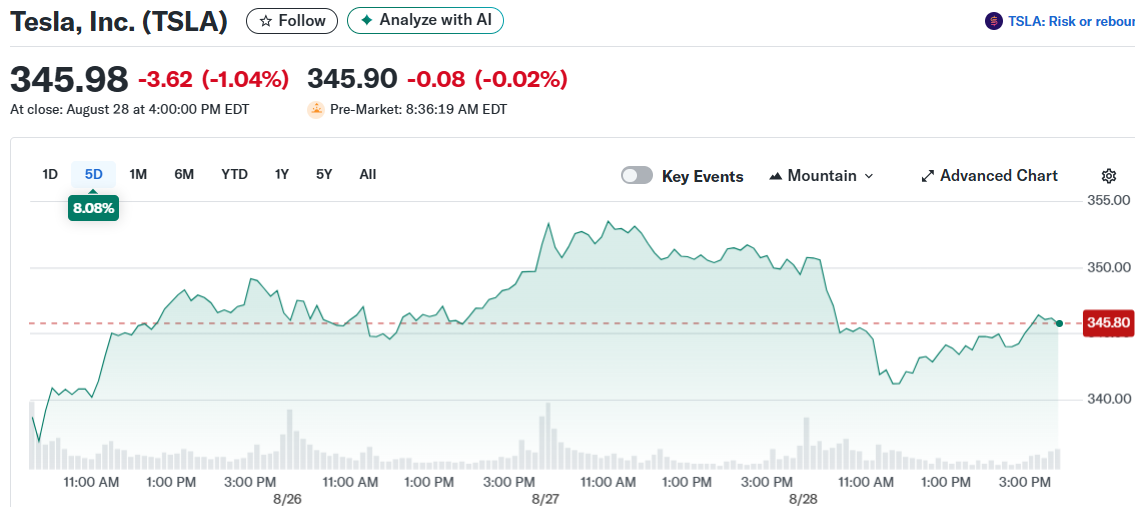TLDR
- Tesla stock fell 1.1% to $345.75 as European vehicle registrations dropped 40% in July to just 8,837 units
- Chinese rival BYD surged 225% in the same period with 13,503 European registrations, overtaking Tesla
- Musk’s legal team filed to move SEC case from Washington D.C. to Texas court for home advantage
- Legal filings reveal Musk spends roughly 60% of his time in Austin since 2020, near Tesla headquarters
- Tesla stock trades between $330-$360 range with technical indicators showing neutral sentiment
Tesla shares dropped 1.1% to $345.75 on Friday as the electric vehicle maker faces mounting challenges in Europe and legal battles in Washington. The stock decline came as new data revealed a troubling trend in one of Tesla’s key markets.

European vehicle registrations for Tesla plummeted 40% year-over-year in July 2025. The company registered just 8,837 units across the EU, UK, Norway, Switzerland and other regional markets. This marks Tesla’s seventh consecutive month of declining European sales.
The drop becomes more concerning when viewed against competitor performance. Chinese automaker BYD registered 13,503 vehicles in Europe during the same month. This represents a massive 225% increase from July 2024, showing BYD is rapidly gaining market share.
The European EV market overall continues to grow. Tesla’s decline appears isolated to the company rather than reflecting broader market weakness. This shift highlights how Chinese manufacturers are successfully entering and competing in European territories.
Tesla’s Aging Lineup Struggles Against Competition
Several factors contribute to Tesla’s European struggles. The company’s vehicle lineup, particularly the Model 3 and Model Y, lacks the novelty of newer competitors. Tesla hasn’t introduced major new models in Europe this year, further weakening its market position.
BYD’s success demonstrates how Chinese automakers are delivering more affordable options. This price advantage becomes crucial in cost-conscious European markets. Tesla’s premium positioning faces increasing pressure from value-oriented alternatives.
CEO Elon Musk’s public behavior and political statements have also impacted brand perception. European consumers increasingly factor leadership transparency and ethics into purchase decisions. This cultural shift appears to work against Tesla’s brand image in socially conscious markets.
Legal Battle Reveals Musk’s Time Allocation
Separately, Musk’s legal team filed a venue transfer motion Thursday. The filing seeks to move an SEC case from Washington D.C. to the Western District of Texas. The case concerns allegedly late-filed beneficial ownership forms related to Twitter stock purchases in April 2022.
The legal documents provide insight into Musk’s schedule and priorities. Jared Birchall, Managing Director of Musk’s family office, stated in court filings that Musk has spent roughly 60% of his time in Austin since 2020. This location puts him near Tesla’s headquarters and manufacturing operations.
“My work covers numerous facets of Mr. Musk’s life and businesses, including his business ventures, philanthropy, political work, and personal and legal matters,” Birchall wrote. The statement supports the venue change request by establishing Musk’s Texas residency pattern.
Investors view Musk’s Austin presence positively. This comes after he spent considerable time in Washington during early 2025 working with the Trump administration. His return to focusing on Tesla operations could benefit the company’s execution.
The SEC case likely won’t impact Tesla stock substantially. A previous battle over Musk’s “funding secured” tweet resulted in $20 million fines for both Tesla and Musk personally. The company weathered that regulatory action without major long-term effects.
Tesla’s stock currently trades in a $330-$360 range. Technical indicators show neutral sentiment with RSI near 48. The 14-day reading suggests neither oversold nor overbought conditions among traders.
Bollinger Bands have narrowed, indicating reduced volatility. This contraction often precedes breakout moves in either direction. Support levels exist at $329 with potential drops toward $305-$310 if broken on high volume.
Resistance appears near $370 with psychological barriers at $400. These levels align with previous failed breakout attempts during Q2 2025. Volume patterns will determine which direction the stock breaks from current consolidation.
Institutional ownership shows cautious positioning. Recent 13F filings reveal reduced exposure from major funds including BlackRock and Vanguard. This trimming reflects shifts toward lower-beta investments as interest rate expectations rise.
Options flow has normalized with balanced put-call ratios. Earlier summer periods showed call-heavy speculation that has since cooled. Traders now appear to hedge downside scenarios rather than position for aggressive gains.
Tesla’s forward P/E remains elevated at approximately 189 times earnings. The trailing P/E exceeds 200, maintaining substantial premiums versus automotive peers. Bulls argue this pricing reflects AI and energy business potential beyond traditional vehicle sales.
Tesla stock needs to close above $340.01 to achieve a fourth consecutive weekly gain. Despite Friday’s decline, shares remain positive for the week. Year-to-date performance shows roughly 14% losses, though 12-month returns stand at approximately 68%.
The company faces Q3 earnings scrutiny as analysts watch for guidance revisions. Operational updates from Giga Berlin and Giga Texas facilities will provide insight into production efficiency. Energy storage and Supercharger network segments could offset automotive weakness.






